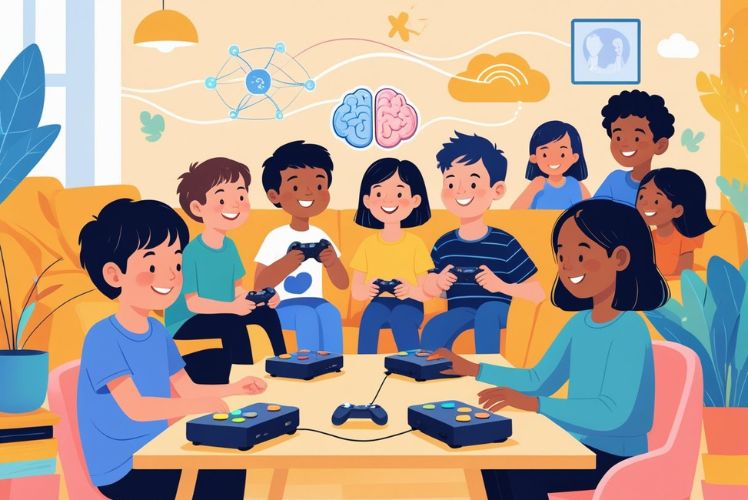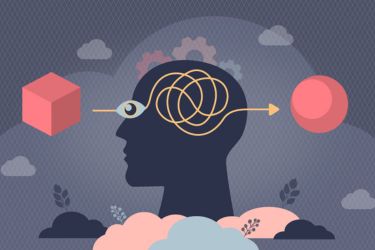Most parents wonder if computer games could be harming their children’s wellbeing and brain development. With screens now part of daily life, choosing the right balance is more important than ever. Research shows that while too much gaming can have negative effects, playing in moderation does not always hurt children's wellbeing or brain growth.

We often hear about the risks of violent content, social isolation, or poor physical health. However, studies also show that gaming can sharpen focus, improve coordination, and help children learn problem-solving skills. The truth is, the impact of computer games depends on how often kids play and what types of games they choose.
It’s important for us to look at both the good and the bad so we can guide young people in making healthy choices. This article explores what research and experts say about the real effects of computer games on our children’s minds and wellbeing.
Key Takeaways
- Computer games can have both positive and negative effects on children.
- Limiting screen time and choosing suitable games is key for healthy development.
- More research is needed to fully understand the long-term impact.
How Video Games Affect Children’s Brain Development

Video games can shape our brains in both positive and negative ways. The impact depends on the type of game, the length of play, and the age of the child.
Cognitive Changes and Memory
Research finds that some video games may boost specific cognitive skills. For example, problem-solving games can encourage faster thinking and better planning. Action video games, especially those with lots of visual information, might help us process things more quickly and improve our memory skills.
Still, not all effects are helpful. If children spend too much time on gaming, they may miss out on important learning and social time. This could slow other forms of mental growth, like language or emotional regulation.
Children who play different genres may see different changes. Puzzle and strategy games often encourage thinking and memory use, while fast-paced action games test quick reactions.
| Game Type | Possible Memory Effect |
|---|---|
| Puzzle/Strategy | Improved planning and recall |
| Action/Shooter | Faster response, better visual memory |
| Casual/Arcade | Little impact |
Attention, Impulse Control, and Hyperactivity
Video games are designed to keep us engaged. Many use unpredictable rewards, which can make it hard for children to stop playing. This pattern can affect how children manage their focus and self-control. Some children may have more trouble with attention and impulse control when gaming becomes excessive.
Continuous play, especially with fast and exciting games, may increase restless or hyperactive behaviours. Children who already struggle with attention or impulse control could be more sensitive to these issues.
On the other hand, some games that require patience and focus may actually help children practise self-control. Parents and carers can help by setting limits and picking games wisely.
Dopamine Release and Neurological Responses
When we play video games, our brains release dopamine—a chemical linked to pleasure and learning. The reward system in many games is unpredictable, which makes children eager to keep playing. According to experts, this is a similar response to what happens during gambling, as seen in slot machines.
Frequent high dopamine release may make some children more hooked on gaming. This could lead to problems if it replaces other healthy activities, like exercise or face-to-face friendships.
Over time, brains may seek frequent stimulation to feel satisfied, making it harder for children to enjoy quieter activities. This is why taking breaks and encouraging other hobbies is important for healthy child development.
Psychological and Emotional Impact of Video Gaming

Video gaming affects children's minds and emotions in many ways. Some games can help children relax and socialise, but others might bring certain risks to their mental health and behaviour.
Mental Health Risks and Emotional Problems
Children who spend too much time gaming may be at higher risk of experiencing mental health issues, such as depression or anxiety. Several studies show that gaming can affect emotional wellbeing, especially if children feel isolated or stressed because of the time they spend online.
Heavy gaming can reduce the time available for spending with family and friends. This can make some children feel lonely or disconnected. Mood swings, irritability, and changes in sleep habits have also been linked to too much gaming.
Parents and caregivers should monitor how gaming makes children feel. Signs of emotional problems may include withdrawing from favourite activities or struggling to manage their feelings. For a deeper look at how gaming influences children’s mental health, see this review on video games and psychosocial wellbeing.
Aggressive Behaviour and Violent Video Games
Violent video games are often discussed regarding their possible link to aggression in children. Some research suggests that playing games with violent content may cause children to show more aggressive thoughts, feelings, or actions for a short time.
Not all studies agree on this effect. Some children are not affected, while others may become less sensitive to violence if they regularly play violent games. It's important to note that aggressive behaviour can have many causes, but violent games are one factor to consider.
We should pay attention to the type of games children play and how these games affect their mood and actions. Parents may want to discuss the difference between real and virtual actions with their children. The possible link between games and aggression is explored further by scientific research.
Addiction and Gaming Disorder
Some children develop patterns of gaming that are hard to control. The term "gaming disorder" or "internet gaming disorder" is used when someone cannot stop playing games, even if it causes problems in their life.
Symptoms of gaming disorder may include:
- Spending most free time gaming
- Losing interest in other hobbies and activities
- Lying about how much time is spent gaming
- Struggling with school or family responsibilities
The American Psychological Association says a diagnosis may be made if these signs last for at least twelve months and cause clear distress. While not every child who loves video games will develop an addiction, it's important to watch for warning signs. More information on this topic can be found in this summary on gaming disorder and addiction.
Social Development and Interpersonal Skills

Children’s social behaviours can change depending on how they engage with computer games. Their communication, social skills, and ways of working with others may be affected positively or negatively. Some games may help build teamwork, while others could increase aggressive or antisocial tendencies.
Social Isolation and Communication
Spending large amounts of time playing computer games can lead to reduced face-to-face interactions. Studies show that excessive screen time often results in fewer opportunities for children to practise communication skills with peers and family. This can cause social withdrawal, leaving children feeling more isolated from those around them.
When children are more focused on digital devices, they may neglect basic social skills such as reading body language or holding conversations. According to recent research, high screen time can make it harder to form friendships and maintain healthy relationships, emphasising the need for balanced device use. These patterns can affect children's social skills development.
Teamwork and Prosocial Behaviour
Not all gaming leads to negative outcomes. Many computer games encourage collaboration and teamwork, especially those that require players to work together to achieve common goals. Multiplayer games can help children practise leadership, cooperation, and problem-solving skills in a group setting.
Some games also reward prosocial behaviour, such as helping others within the game or achieving team-based objectives. These experiences can carry over to real-life situations, promoting better social interactions and stronger communication skills with peers. Structured team play can support emotional regulation and empathy, helping children build positive personality traits.
Aggressive Cognitions and Antisocial Behaviour
There is evidence that some video games, especially violent ones, may increase aggressive thoughts and antisocial behaviour in children. Fast-paced and competitive games with violent content can lead to a rise in aggressive cognitions, making children more likely to react angrily in social situations.
Over time, exposure to repeated violent or antisocial acts within games may dull children’s sensitivity to aggression, making these behaviours seem more normal. It is important to remember that not all children are affected in the same way, as personality traits and family environment also play significant roles. We should be mindful of content choices and encourage games that promote healthy social behaviours, as discussed in studies on the effects of video games on children's social development.
Academic Performance and Healthy Habits

Computer games influence many parts of children’s lives, from how well they do at school to their daily routines. We need to look at the evidence to understand how screen time, academic achievement, and health habits are all connected.
Impact on Academic Achievement
We can see that playing video games for long hours is often linked with lower academic performance. Studies show a clear negative correlation between academic results and time spent on games. Pupils who spend more time gaming may find it harder to focus on homework and may need extra help from classmates to complete tasks.
Specific types of games, especially those that are highly stimulating, can distract from study time and make children less likely to prioritise schoolwork. On the flip side, moderate gaming does not always have the same effect, and games with educational content can sometimes help with problem-solving skills. However, when gaming replaces study or revision time, grades tend to suffer. One study highlights that problematic behaviour at school is more often seen in those who play for many hours daily.
Screen Time and Physical Health
Screen time has an important effect on children's health. Spending a lot of time in front of screens means less time for movement and exercise, which are crucial for growing children. The NHS recommends that children get at least 60 minutes of physical activity each day, but heavy gaming can make this unlikely for many.
Reduced movement can make children less fit and contribute to other health problems. It may also affect cognitive development, as regular exercise is important for both brain and body. Research shows that too much screen time is connected to a range of negative health effects, including reduced physical activity and issues with sleep patterns, which are vital for healthy brain growth.
Obesity and Lifestyle Factors
Obesity is another concern when it comes to excessive gaming. Sedentary hobbies like video games contribute to lower energy use and can lead to weight gain over time. Unhealthy snacking while gaming is also common, which increases this risk even more.
We should note that obesity in children is linked to higher risk of diabetes, high blood pressure, and other medical conditions. Moderation is key; balancing gaming with active play, meals rich in nutrients, and regular movement helps children develop healthy habits. Families that set clear limits on screen time and encourage other activities are more likely to see positive changes in wellbeing and health.
Moderation, Game Design, and Positive Outcomes
Computer games impact children in many ways. How often, what kind, and how games are designed all play important roles in shaping their effects.
Moderation and Healthy Gaming Habits
Moderation is essential to help children enjoy the benefits of video games without facing negative effects. Allowing games in limited amounts can support a healthy balance between screen time and other activities like outdoor play, family time, and schoolwork.
A clear gaming schedule can help children form good habits. Parents and carers should discuss boundaries and stick to them. Monitoring gaming frequency ensures children do not replace important activities or sleep with screen time. When we set limits and encourage breaks, we reduce risks like eye strain, lack of exercise, and issues with mood or attention.
Some studies have shown that too much gaming may affect social development and thinking skills, especially as children get older. Setting routines and open conversations about gaming help young people make good choices.
Benefits and Positive Effects of Video Games
When played in moderation, video games can offer several benefits. Many games help improve concentration and reaction time by keeping the mind alert and challenged.
Research points to positive effects, such as higher happiness and improved academic results, when games include learning aspects or require focus and quick thinking. Multiplayer games also give children the chance to socialise and build friendships, even across distances. This can help develop teamwork and cooperation.
Certain games support language and communication skills, especially when played with others. Benefits of video games include practice in reading instructions, understanding stories, and even learning new words. Balanced gameplay paired with support from adults allows children to make the most of their experience.
Creativity, Problem Solving, and Skill Development
Video games often ask players to solve puzzles or think creatively. This helps boost problem solving skills and encourages flexible thinking. Games like building simulators or open-world adventures require players to plan, design, and make decisions that affect the outcome.
Creativity flourishes when children build, draw, or invent inside the virtual worlds. Games can let us experiment with ideas, try new strategies, and see the effects of our choices quickly. Children practise skills such as logic, sequencing, and spatial awareness, which are useful in both school and daily life.
List of Skills Supported by Games:
- Critical thinking
- Time management
- Logic and planning
- Teamwork and communication
Influence of Game Design and Technology
Game design affects how children interact with technology. Features like rewards, level progression, and bright graphics can keep players engaged for long periods. Video game consoles and mobile devices make gaming easy to access at any time.
Some games encourage helpful behaviours, like cooperation, while others may focus on competition or even violence. This makes it important for us to check game content and select age-appropriate experiences. Advances in technology, including virtual reality and online play, have created new ways for children to connect, learn, and explore.
Game mechanics—such as adjustable difficulty, hints, and feedback—can support learning and development. When combined with good gaming habits, thoughtful game design turns video games into valuable tools for growth and development.
Long-Term Consequences and Future Research
It is clear that computer gaming can affect children’s wellbeing and brain development in different ways over time. The impact depends on factors such as the child’s age, the content of the games, and how much time is spent playing.
Risk Factors and Vulnerable Groups
Certain children may be more at risk for negative outcomes from frequent gaming. For example, those with pre-existing mental health problems—such as low self-esteem or depression—may be more likely to spend large amounts of time on games. This can increase feelings of isolation or worsen their mood.
Other risk factors include lack of parental supervision, easy access to devices in bedrooms, and little involvement in outdoor or social activities. Boys have typically been found to play more often than girls, which can increase their exposure to possible negative effects.
Research shows not every child is equally vulnerable. Children with strong family relationships, hobbies outside of screens, and regular physical activity have a lower risk of negative consequences. Recognising these risk factors helps us better support children who may struggle most.
Findings from Longitudinal Studies
Longitudinal studies track children and adolescents over months or years to see how gaming habits influence development. These studies reveal both positive and negative findings.
Some research has shown that heavy use of computer games may be linked to lower academic performance and poor sleep quality in the long term. There are also measurable changes in brain structure and function in some children who spend much time on screens, including long-term effects on brain function.
However, not all effects are negative. Certain games can support problem-solving, hand-eye coordination, and even teamwork. The nature of the games and the social context play important roles.
Researchers agree that more studies are needed to understand exactly which patterns of gaming lead to long-term risks, which children are most affected, and how these effects change as children grow. Further research is ongoing to uncover these underlying mechanisms.
Recommendations for Parents and Guardians
We can reduce risks by setting clear guidelines for game use at home. It is helpful to create time limits for play and encourage children to take breaks. Involving children in other activities, such as sports, reading, or family outings, helps balance their daily routine.
Parents should pay attention to game content and choose age-appropriate options. Co-playing or talking with children about their gaming experiences can build trust and keep communication open.
If signs of distress appear—such as dropping grades, withdrawal from friends, or mood changes—seeking advice from school counsellors or mental health professionals is advisable. Simple steps like removing devices from bedrooms can also help reduce many health risks linked to too much gaming.
Parents and guardians who stay involved and informed give children the best chance to enjoy gaming safely, without major harm to their wellbeing or development.
Frequently Asked Questions
We know that gaming is a common part of many children’s lives and interests. Understanding its specific effects on thinking, social skills, learning, mood, and health helps us make informed decisions.
What are the recognised impacts of video gaming on a child's cognitive development?
Research shows that some video games can help children develop problem-solving skills and improve memory. Games that require strategic thinking often challenge the brain and help with quick decision-making. However, excessive gaming may limit time spent on other activities important for development, such as reading or outdoor play.
In what ways can video games potentially influence a child's social behaviour?
Gaming can boost social connections when children play cooperatively or work as a team in multiplayer games. Some families also use video games for bonding time. Still, there is concern that too much time spent gaming may lead to less face-to-face interaction and could increase the risk of anti-social behaviour in certain cases.
What does current research suggest about the relationship between video gaming and academic performance in children?
The evidence is mixed. Some research points out that moderate gaming does not seem to harm school performance and, in some cases, may help children learn certain skills. However, when screen time becomes excessive, it can take away from homework and study time, which may affect academic success.
How do video games affect attention spans and learning abilities in the younger population?
Fast-paced games can reduce attention spans if played too often, as children get used to quick rewards and constant stimulation. This may make focusing in quieter classroom settings more difficult. On the other hand, some games designed as brain training can help improve focus when used in moderation.
What are the possible correlations between video gaming and mood disorders in children?
Some studies have found a link between heavy gaming and increased risk of anxiety or depression, especially when children use games to escape from real-life problems. While not all children are affected the same way, excessive video game use has been associated with mood changes in some children.
To what extent do video games contribute to physical health issues in the paediatric demographic?
Too much gaming often leads to less physical activity, which may contribute to weight gain and weaker physical fitness. Eyestrain, headaches, and poor sleep are also common complaints among children who spend many hours in front of screens. Taking regular breaks and balancing gaming with outdoor activities can help reduce these risks.





















